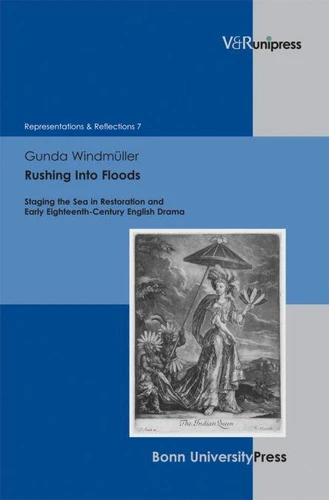Rushing Into Floods. Staging the Sea in Restoration and Early Eighteenth - Century English Drama
Par : , , ,Formats :
Disponible dans votre compte client Decitre ou Furet du Nord dès validation de votre commande. Le format PDF est :
- Compatible avec une lecture sur My Vivlio (smartphone, tablette, ordinateur)
- Compatible avec une lecture sur liseuses Vivlio
- Pour les liseuses autres que Vivlio, vous devez utiliser le logiciel Adobe Digital Edition. Non compatible avec la lecture sur les liseuses Kindle, Remarkable et Sony
 , qui est-ce ?
, qui est-ce ?Notre partenaire de plateforme de lecture numérique où vous retrouverez l'ensemble de vos ebooks gratuitement
Pour en savoir plus sur nos ebooks, consultez notre aide en ligne ici
- Nombre de pages341
- FormatPDF
- ISBN978-3-86234-968-5
- EAN9783862349685
- Date de parution23/05/2012
- Protection num.pas de protection
- Taille3 Mo
- Infos supplémentairespdf
- ÉditeurV&R Unipress
Résumé
The dramatic representation of maritime spaces, characters and plots in Restoration and early eighteenth-century English theatres served as a crucial discursive negotiation of a burgeoning empire. This study focuses on 'staging the sea' in a period of growing maritime, commercial and colonial activity, a time when the prominence of the sea and shipping was firmly established in the very fabric of English life.
As theatres were re-established after the Restoration, playhouses soon became very visible spaces of cultural activity and important locales for staging cultural contact and conflict. Plays staging the sea can be read as central in representing the budding maritime empire to metropolitan audiences, as well as negotiating political power and knowledge about the "other". The study explores well-known plays by authors such as Aphra Behn and William Wycherley alongside a host of more obscure plays by authors such as Edward Ravenscroft and Charles Gildon as cultural performances for negotiating cultural identity and difference in the late seventeenth and early eighteenth centuries.
As theatres were re-established after the Restoration, playhouses soon became very visible spaces of cultural activity and important locales for staging cultural contact and conflict. Plays staging the sea can be read as central in representing the budding maritime empire to metropolitan audiences, as well as negotiating political power and knowledge about the "other". The study explores well-known plays by authors such as Aphra Behn and William Wycherley alongside a host of more obscure plays by authors such as Edward Ravenscroft and Charles Gildon as cultural performances for negotiating cultural identity and difference in the late seventeenth and early eighteenth centuries.
The dramatic representation of maritime spaces, characters and plots in Restoration and early eighteenth-century English theatres served as a crucial discursive negotiation of a burgeoning empire. This study focuses on 'staging the sea' in a period of growing maritime, commercial and colonial activity, a time when the prominence of the sea and shipping was firmly established in the very fabric of English life.
As theatres were re-established after the Restoration, playhouses soon became very visible spaces of cultural activity and important locales for staging cultural contact and conflict. Plays staging the sea can be read as central in representing the budding maritime empire to metropolitan audiences, as well as negotiating political power and knowledge about the "other". The study explores well-known plays by authors such as Aphra Behn and William Wycherley alongside a host of more obscure plays by authors such as Edward Ravenscroft and Charles Gildon as cultural performances for negotiating cultural identity and difference in the late seventeenth and early eighteenth centuries.
As theatres were re-established after the Restoration, playhouses soon became very visible spaces of cultural activity and important locales for staging cultural contact and conflict. Plays staging the sea can be read as central in representing the budding maritime empire to metropolitan audiences, as well as negotiating political power and knowledge about the "other". The study explores well-known plays by authors such as Aphra Behn and William Wycherley alongside a host of more obscure plays by authors such as Edward Ravenscroft and Charles Gildon as cultural performances for negotiating cultural identity and difference in the late seventeenth and early eighteenth centuries.



